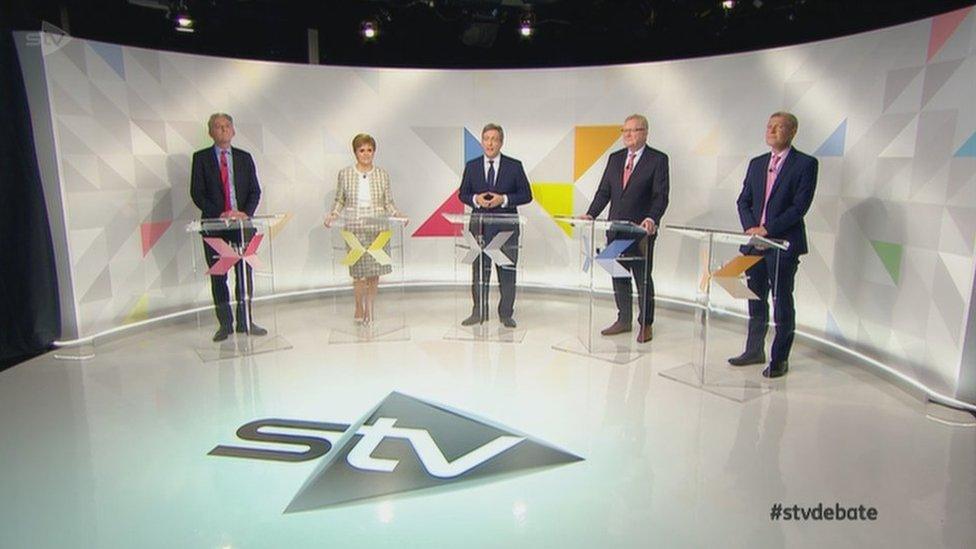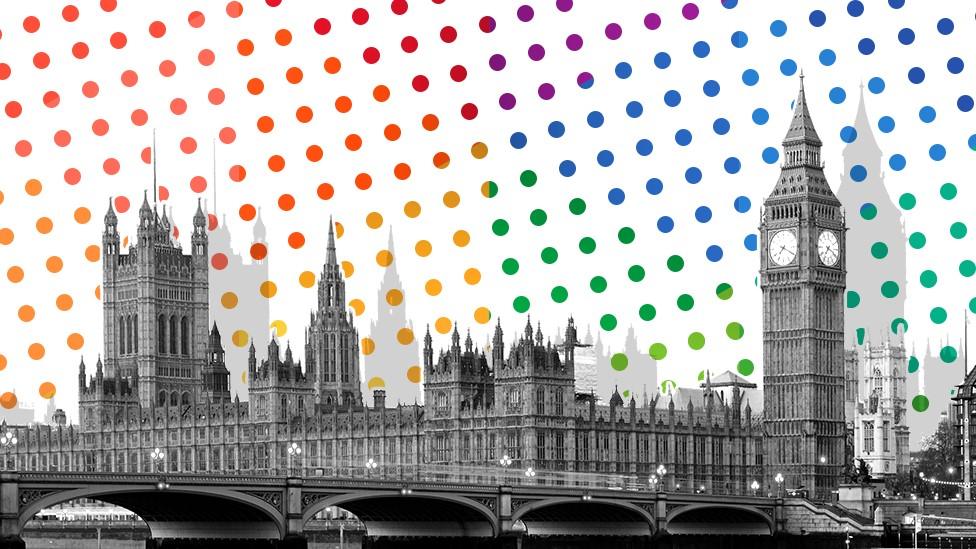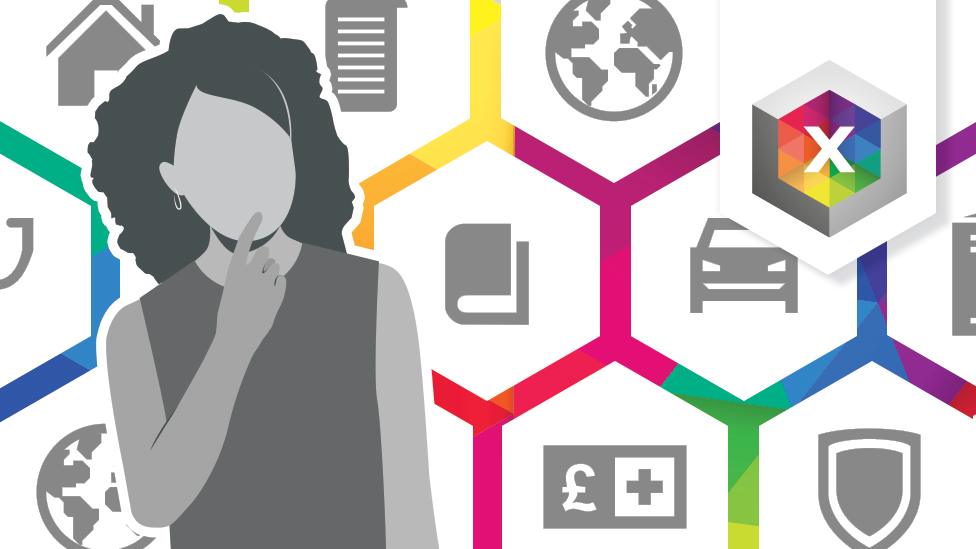Election 2019: Scottish party leaders clash in debate
- Published
- comments

The four major Scottish party leaders have clashed in a debate ahead of next week's 12 December general election.
SNP leader Nicola Sturgeon, the Scottish Conservatives' interim leader Jackson Carlaw, Willie Rennie of the Scottish Lib Dems and Scottish Labour's Richard Leonard all took part.
The politicians were challenged on their records and views on indyref2.
The first TV debate of the election in Scotland was broadcast by STV, external, hosted by political editor Colin Mackay.
Ms Sturgeon said Scotland's future was "on the line at this election", adding: "We want Scotland to be an independent, internationalist country and we are determined that the people of Scotland will have the right to make that choice."
The SNP leader was adamant that Boris Johnson was "utterly unfit" to be prime minister and "must be stopped".
She added that a Conservative government would have "damaging consequences" for Scotland and that her party could deny the Tories "the majority they crave" at Westminster.
Meanwhile, Jackson Carlaw said Ms Sturgeon did not "respect the result" of referendums. He warned that if the Tories are not the largest party in the Commons after 12 December, Mr Corbyn could "sell out Scotland and cave in to Nicola Sturgeon's demand" for a second vote on independence in 2020.
He said "the union is on the ballot paper", and claimed she and Jeremy Corbyn could "take over our country next week".
"Next Friday, do you want Jeremy Corbyn in Number 10 with Nicola Sturgeon pulling the strings?", he asked.

CONFUSED? Our simple election guide, external
POLICY GUIDE: Who should I vote for?, external
POSTCODE SEARCH: Find your local candidates, external

The Lib Dem's Willie Rennie said he wanted to stop Brexit and indyref2, and called for "an end to the constitutional division we have endured for almost a decade".
He said the climate emergency, mental health, childcare and growing the economy, external should be the next UK government's focus.
Mr Rennie urged voters: "If you want to stop Brexit, stop independence, so that we can build a brighter future then vote Liberal Democrat."
And Richard Leonard said that Scottish independence would be "economically devastating". He said it "would lead to a hard border" between Scotland and the rest of the UK, as well as "turbo-charged austerity".
However, he said there should not be an "indefinite lock" on another independence poll, saying that a majority for the SNP at the Holyrood elections in "2021, 2026 or 2031" would give them a mandate for a Section 30 order.
The Scottish Labour leader also said that it was a "straight choice" for voters - either a Conservative or Labour government at Westminster. He said: "Labour can get to work next week to build an economy that works not just for the few at the top, but which works for the many."
Apologies demanded over political records
The TV debate gave the party leaders the chance to question their rivals on their records.
Nicola Sturgeon was taken to task by Willie Rennie on the standard of education in Scotland's schools, after an international report said performance in reading improved but declined in maths and science.
But she rebuffed criticism and said the attainment gap was closing, external. The first minister said the experts who carried out the research suggested that reading performance had increased "substantially" - while she claimed they had described maths and science performance as "stable".
And Jackson Carlaw was challenged over the Tory government's implementation of universal credit, external, which replaced a number of previous benefits. Richard Leonard said "tens of thousands of families across Scotland have been pushed into poverty" by the benefit.
Mr Carlaw said he conceded there had been flaws and problems with its implementation. But he said it was "designed to get people into work... and we now have a record number of people working".
Willie Rennie was challenged over the Lib Dems' record, external while they were in coalition with the Tories between 2010 and 2015. Nicola Sturgeon called them the "co-architects of austerity".
But Mr Rennie said the Lib Dems had been "determined" to "get the finances back in order". He added that his party stabilised the UK's finances and stopped £12bn of welfare cuts.
Richard Leonard was challenged over his position on Trident, external by Nicola Sturgeon. While he supports nuclear disarmament (as does Nicola Sturgeon and the UK Labour leader Jeremy Corbyn), it is Labour policy to support the renewal of the UK's nuclear deterrent, external, which is stationed at Faslane naval base on the Clyde.
Mr Leonard said there was an "international atmosphere of rearmament" which made it "even more important" to see a new "international imitative around peace and disarmament".
On Tuesday 10 December - just two days before the general election - the same Scottish party leaders will debate again. They will face questions from a live studio audience, presented by the BBC's Scotland editor Sarah Smith.
- Published6 December 2019

- Published11 December 2019
